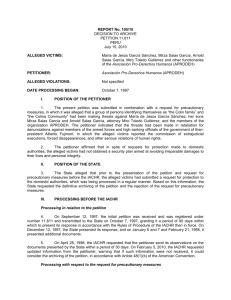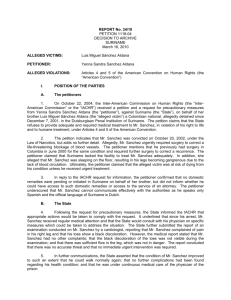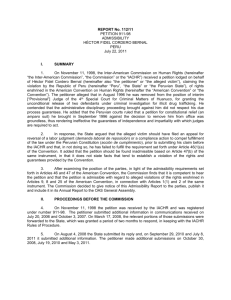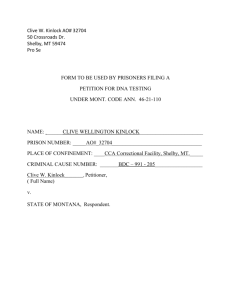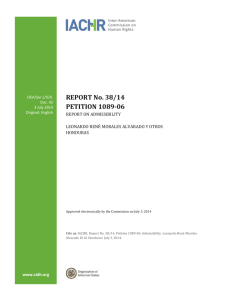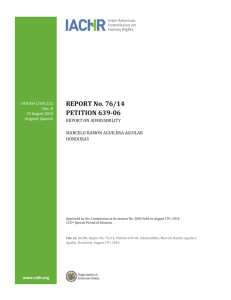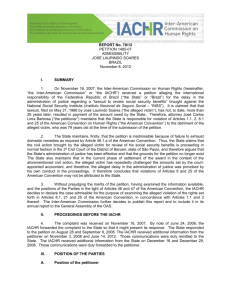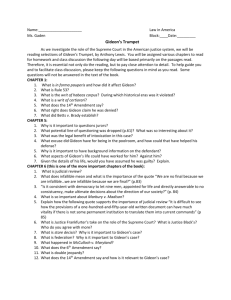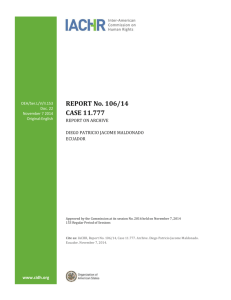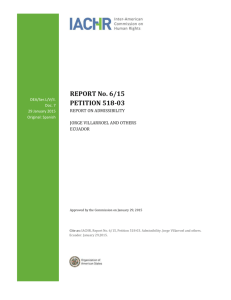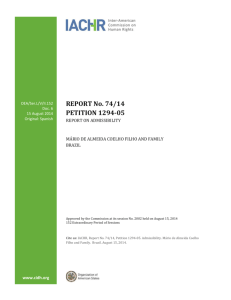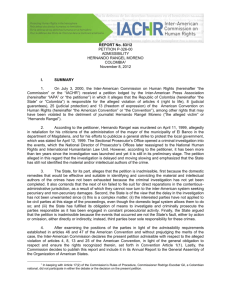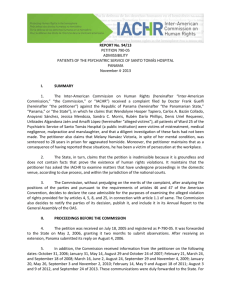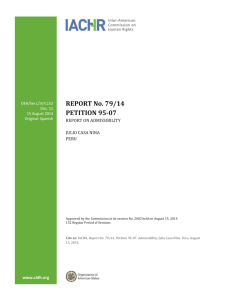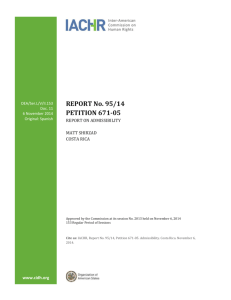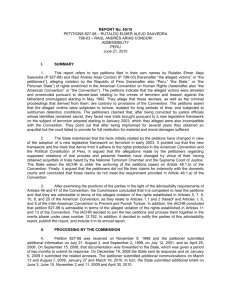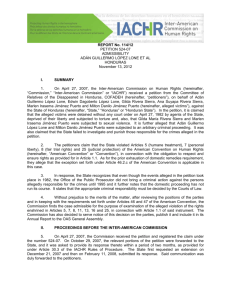REPORT No. 86/14 PETITION 496-01
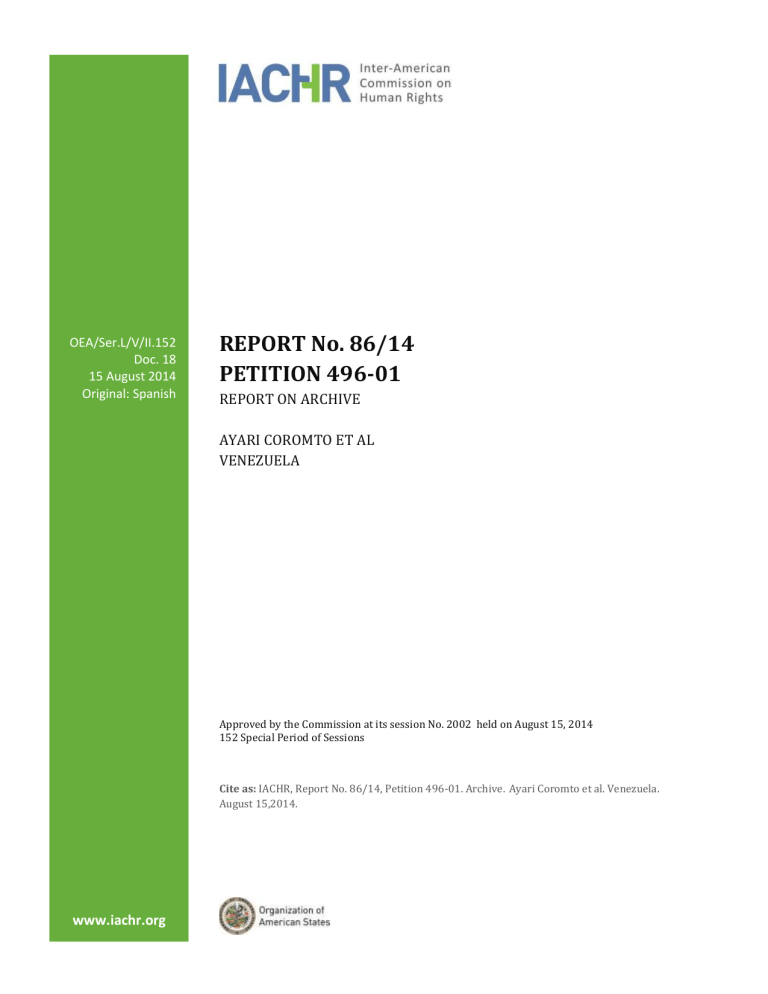
OEA/Ser.L/V/II.152
Doc. 18
15 August 2014
Original: Spanish
REPORT No. 86/14
PETITION 496-01
REPORT ON ARCHIVE
AYARI COROMTO ET AL
VENEZUELA
Approved by the Commission at its session No. 2002 held on August 15, 2014
152 Special Period of Sessions
Cite as: IACHR, Report No. 86/14, Petition 496-01. Archive.
Ayari Coromto et al. Venezuela.
August 15,2014.
www.iachr.org
REPORT No. 86/14
PETITION 496-01
DECISION TO ARCHIVE
AYARI COROMTO ET AL
VENEZUELA
AUGUST 15, 2014
ALLEGED VICTIM:
PETITIONER:
ALLEGED VIOLATIONS:
Ayari Coromto et al
Herviz González
DATE PROCESSING BEGAN:
I. POSITION OF THE PETITIONER
Articles 3, 8, 24 and 25 of the American Convention on
Human Rights and Articles XIV and XXIV of the American
Declaration of the Rights and Duties of Man
July 30, 2001
1.
On July 30, 2001, the Inter-American Commission on Human Rights (hereinafter “the
Commission” or “the IACHR”) received a petition lodged by Herviz González C. (hereinafter “the petitioner”) on behalf of Ayari Coromto Assing Vargas, Oscar Alberto Bruzzo Duncan, Ana Zulia Coromto Baute Diaz, Feliz
Ricardo Perez Marchena, Gustavo Emilio Torres Tortolero, Walter Carmine Miranda Pierantozzi, Antonio
Javier Perez Perez, Angel Antonio Seijas Solano, Antonio Alexis Bolletti Valero, Carlos Jose Padilla Marval, Luz
Marina Calero Morales, Norma Vazquez, Victoria Josefina Vargas Mejias, Jorge Aníbal Mijares, Jose Francisco
Sánchez Starke and Rafael Emilio Rodríguez Prado (hereinafter “the alleged victims”), claiming international responsibility of the Bolivarian Republic of Venezuela (hereinafter “the State”) for alleged violations of the rights set forth in Articles 3, 8, 24, 25 of the American Convention on Human Rights (hereinafter “the
Convention” or “the American Convention”) and Articles XIV and XXIV of the American Declaration of the
Rights and Duties of Man (hereinafter “the Declaration”).
2.
The petitioner contended that the alleged victims had obtained their architecture and engineering degrees, respectively, at the technical school of higher education known as the Instituto
Universitario Politécnico “Santiago Mariño” (hereinafter “the Institute”), which were approved by the
Venezuelan Ministry of Education. However, they were unable to become members of the official association of the profession because the Office of Professional Membership of the College of Engineers had rejected their degrees. The petitioners claim that this act constitutes a violation of the alleged victims’ right to work, inasmuch as membership in the professional association was mandatory in order to be able to practice in the field.
3.
The petitioner claimed that on June 11, 1997, she filed a petition for constitutional relief
(amparo), which was partially granted on July 23, 1997. Consequently, the College of Engineers was directed to process the applications for membership and issue a decision on each one. By the account of the petitioner, the applications were processed and they were denied membership once again. In response, the alleged victims filed a motion for “execution of judgment granting constitutional relief,” which was denied on May 21,
1999, as it was ruled that the College of Engineers had indeed complied with the order in the amparo judgment. The petitioner filed an appeal and the Supreme Court of Justice upheld the decision.
4.
The petitioner also claimed that on April 29, 2001, the College of Engineers took out an article in the daily newspaper “El Nacional” voicing its “concern over the hiring of graduates from certain institutes of higher education, [which are] not authorized by this Institution” and issued the recommendation to “not engage any graduates not certified by this professional association in positions in which they perform competencies typical of engineers and architects.” Additionally, on May 8, 2001, a new communiqué was
1
released by the College of Engineers publicly discrediting the Instituto Politécnico “Santiago Mariño.” The petitioner argued that this conduct of the College of Engineers violated the alleged victims’ right to equal protection. Lastly, the petitioner claimed that excessive delay in the decision-making process amounted to a violation of Article 25 of the American Convention.
II. POSITION OF THE STATE
5.
The State argued failure to exhaust domestic remedies, on the grounds that the refusal to grant membership by the College of Engineers had been contested through administrative proceedings and, after that avenue had been exhausted, an appeal could have been brought through judicial proceedings by filing a motion to overturn an administrative decision, and the decision on this motion could have also been appealed.
6.
As for the alleged violation of right to be recognized as a person before the law, the State contended that the petitioner had not presented an adequate case. With respect to the right to work and equal protection, it claimed that the situation had been remedied by the Judiciary, which had ordered the alleged victims’ applications for membership to be accepted and processed. The College of Engineers had abided by the order issued in the judgment but, because requirements were not met for this purpose, the alleged victims were not eligible to join the College. According to the State’s argument, they sought to become members of the College via forced execution of judgment, but that this was not part of the intent of the judgment that was to be executed and instead constituted new and separate grounds for an amparo claim for constitutional relief.
7.
The State contended that the petitioner contradicted herself by jointly claiming a violation of the right to be heard and to a timely response, submitting the responses that had been given by the State before more than one judicial body. In light of this scenario, the State argued that, even though the right to be heard is different from the right to access to justice, the latter right “constitutes a pathway to achieve the realization of the right to be heard.”
III. PROCESSING BEFORE THE IACHR
8. On July 30, 2001, the petitioner lodged her petition, which was assigned the case number
496-01. On November 30, 2001 and January 14, 2002, the petitioner submitted additional information. On
February 8, 2002, the Commission forwarded the relevant portions of the petition to the State in order for it to submit its reply within a period of 30 days. On May 14, 2002, the State requested an extension, which was granted by the IACHR, pursuant to Article 30.3 of the Rules of Procedure in force at the time. On October 18,
2002, the State submitted its response, which was forwarded to the petitioner for her observations. On
November 21, 2002, the petitioner submitted observations, which were forwarded to the State.
9. On September 12, 2005, July 5, 2007 and February 13, 2013, the petitioner was asked for updated information regarding the instant matter, and was advised that in the event that such information was not submitted within a period of one month, the IACHR could archive the case. As of the present date, the
IACHR has not received the observations it requested.
IV. BASIS FOR THE DECISION TO ARHIVE
10. Both Article 48.1.b of the American Convention on Human Rights and Article 42 of the Rules of Procedure of the Inter-American Commission on Human Rights establish that in processing a petition, after the information has been received, or after the period established has elapsed and the information has not been received, the IACHR shall ascertain whether the grounds for the petition or communication still exist. If they do not, the Commission shall order the record to be closed. Article 42.1.a of the Rules of Procedure also sets forth that, at any time during the proceedings, the IACHR may decide to archive the case file, when the information necessary for the adoption of a decision is unavailable.
2
11. In the instant proceedings, the petitioners did not reply to the requests for information dated September 12, 2005, July 5, 2007 and February 13, 2013. Such circumstances render it impossible to proceed to case examination or to determining whether the grounds for the original petition still exist.
Accordingly, pursuant to Article 48.1.b of the Convention, as well as Article 42 of the IACHR Rules of
Procedure, it is decided to archive the instant petition.
Approved by the Inter-American Commission on Human Rights in the city of Mexico on the 15th day of the month of August, 2014. (Signed): Tracy Robinson, President; Rose-Marie Belle Antoine, First Vice-President;
Felipe González, Second Vice President; José de Jesús Orozco Henríquez, Rosa María Ortiz, Paulo Vannuchi and
James L. Cavallaro, Commissioners.
3
